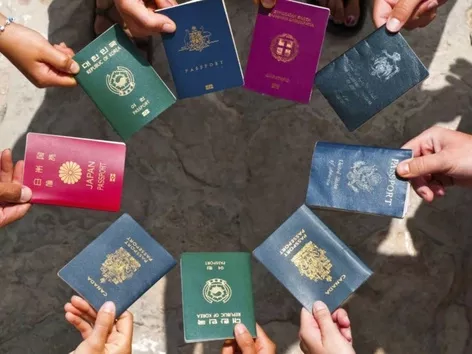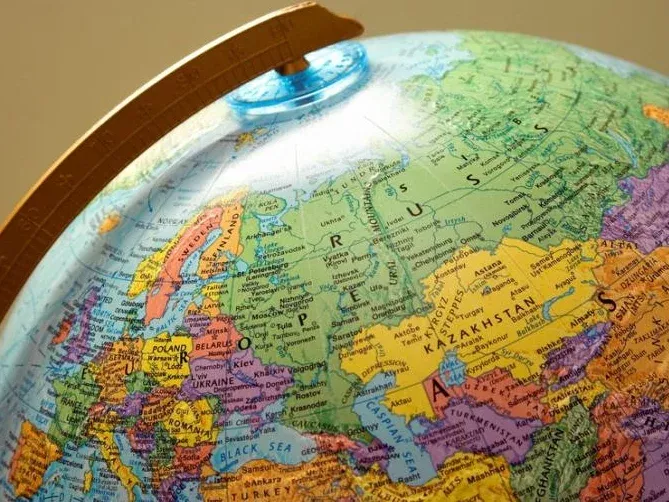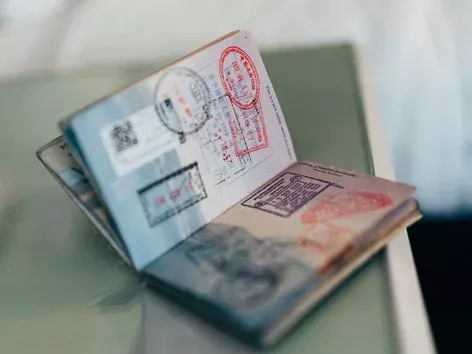Dual and second citizenship: what is the difference?
Table of contents
- The main difference between dual and second citizenship
- What is dual citizenship?
- Which countries allow their citizens to obtain dual citizenship?
- Advantages and disadvantages of dual citizenship
- How to get dual citizenship?
- What is a second citizenship?
- Advantages and disadvantages of second citizenship
- Duties of holders of second and dual citizenship
- How to get a second citizenship?

Obtaining a second passport is a fairly popular procedure among foreigners and has many advantages. Find out more about the difference between dual and second citizenship and the nuances of obtaining it
Investors and expats are increasingly getting a second passport, because it has quite a lot of advantages: tax benefits, simplified conditions for obtaining a visa, moving to a country with better social conditions, etc. In migration policy, there are two ways of registering multiple citizenship: dual and second citizenship are completely different concepts, each of which has its own advantages and disadvantages.
What is the difference between dual and second citizenship? We will find out further.
The main difference between dual and second citizenship
Dual citizenship – a person has passports of two countries and both states at the official level recognize the rights and obligations of a person in each state.
Second citizenship – a person has passports of several countries, but each state considers that a bipatriate is only its citizen.
The difference is only in the presence or absence of agreements between states. That is, in the first case, the state recognizes the status of a bipatriate (a person with multiple citizenships) and the rights and obligations of a citizen in relation to another country, in the second case, the state considers a person only its citizen.
Importantly! The legal term "triple citizenship" does not exist in the legislation, so even if a person has three or more passports, according to the terminology, he still has dual or second citizenship.
What is dual citizenship?
Dual citizenship is based on bilateral agreements between states. For example, such agreements exist between Spain and its former colonies: Peru, Chile, Paraguay, Nicaragua, Guatemala, Bolivia, Ecuador, Costa Rica, Honduras, the Dominican Republic, Argentina and Colombia.
Expats with dual citizenship can choose which country to serve in the military, and their children are entitled to two passports at birth.
Which countries allow their citizens to obtain dual citizenship?
Almost 75% of countries in the world recognize the acquisition of dual citizenship. Of course, each state can set its own rules and restrictions for this procedure.
Dual citizenship is allowed in the following countries: Australia, Angola, Armenia, Belize, Brazil, United Kingdom, East Timor, Hong Kong, Denmark, Egypt, Ireland, Albania, Antigua and Barbuda, Bangladesh, Belgium, Vanuatu, Sudan, Ghana, Grenada, Dominica, Zambia, Jordan, Iceland, Algeria, Argentina, Barbados, Bolivia, Hungary, Honduras, Greece, Dominican Republic, Israel, Iraq, Italy, Chile, New Zealand, Macedonia, Morocco, USA, Peru, Romania, Saint Lucia, Trinidad, France, Cape Verde, Cyprus, Ivory Coast, Libya, Palestine, Canada, Colombia, Latvia, Luxembourg, Maldives, Mexico, Pakistan, Panama, Portugal, Samoa, Serbia, Tuvalu, Kenya, Costa Rica, Lebanon, Mauritius , Malta, Nauru, Palau, Paraguay, Russia, Saint Kitts and Nevis, Syria, Tunisia, Finland, Fiji, Philippines, Switzerland, Ecuador, Czech Republic, Sweden, South Africa, Sri Lanka, Jamaica. Look for the immigration procedure for these countries on the Visit World portal.
In exceptional cases, Afghanistan, Bulgaria, Eritrea, Germany, Liechtenstein, Montenegro, Nicaragua, Poland, Slovenia, Taiwan, Austria, Croatia, Estonia, Guatemala, Bosnia, El Salvador, Georgia, Guyana, Lithuania, Namibia, Nigeria, St. -Vincent and the Grenadines, Moldova, Netherlands, Norway, Seychelles, South Africa, Tanzania, Spain and Zimbabwe.
Not every country allows its citizens or residents of other countries to have more than one passport. For example, China, India and the UAE do not allow obtaining a second citizenship, automatically depriving their subjects of the right to reside in the state if they do become citizens of another state.
Saudi Arabia is even more categorical, in the state obtaining another passport without first rejecting the original one is considered a criminal offense.
The following countries prohibit second citizenship: Andorra, Azerbaijan, Bahrain, Belarus, Botswana, Cuba, Haiti, China, Djibouti, India, Japan, Kyrgyzstan, Bahamas, Bhutan, Congo, Ethiopia, Indonesia, Kazakhstan, Iran, Kuwait, Macau, Micronesia , Laos, Malaysia, Monaco, Marshall Islands, Mongolia, Mozambique, North Korea, Qatar, Myanmar, Oman, San Marino, Nepal, Papua New Guinea, Saudi Arabia, Singapore, Slovakia, Swaziland, Solomon Islands, Thailand, Tajikistan, Turkmenistan, Tonga, UAE, Ukraine, Uzbekistan, Venezuela, Vietnam and Yemen.
Advantages and disadvantages of dual citizenship
A person with dual citizenship receives rights in both states, but it is impossible to use them at the same time. It is allowed to use benefits only in the country of residence.
The advantages include the ability to live and travel in countries without a visa, simplified conditions for doing business, the ability to receive diplomatic assistance in the representations of both countries when staying in a third country.
How to get dual citizenship?
To obtain dual citizenship, the following criteria must be met:
- the child's parents have citizenship of different countries;
- the state border in the country of residence was changed;
- the child was adopted by foreigners;
- a person received citizenship through naturalization or repatriation.
What is a second citizenship?
A person can have passports of several countries, but no state will know about it. This is possible when the law of the country does not require its citizens to inform about the issuance of a second passport.
A second citizenship can be obtained in various ways: by participating in an investment program, through marriage, through naturalization, etc.
Advantages and disadvantages of second citizenship
Second citizenship can give a foreigner many advantages that dual citizenship does not have:
1. Global mobility is one of the main reasons for obtaining a second passport. For example, an Indian passport allows you to visit only 60 countries without a visa. For comparison, the passport of one of the Caribbean countries is more than 140 countries. Citizens of Caribbean countries can freely enter the Schengen zone, Great Britain, Hong Kong, China, Singapore, etc.
2. Education abroad - in order to study at a foreign university, a student must obtain a residence permit and renew it every year. However, the countries of the Caribbean basin are part of the Commonwealth and receive certain advantages when entering universities in Great Britain.
3. The possibility of opening an account in European banks, which allows you to keep money in a more stable currency and not lose commissions for foreign transfers.
4. Change of tax residency - a citizen can choose a more favorable taxation system and optimize his expenses.
5. The opportunity to live in a country with a higher quality of life.
6. Career prospects and business opportunities.
7. Social guarantees in both countries.
8. Backup country for residence in case of instability in the country of origin.
Disadvantages include the fact that each country considers a person to be its own citizen, that is, a bipatriate has obligations to both states, so in certain cases it will be necessary to pay double taxes or serve in the army of both countries.
Duties of holders of second and dual citizenship
1. Know and comply with the legislation of both states. Bipatrid should study the legislation of two countries in detail. For example, in the Caribbean you must be a member of a jury in court if necessary and vote in elections.
2. Restrictions on civil service. A person with a second citizenship will not be able to hold high government positions. For example, they are usually prohibited from working in the prosecutor's office, being members of the government, or having access to state secrets.
3. Service in the army - in the case of obtaining a second citizenship, when each country recognizes a person only as its citizen, there is a possibility that a person will have to serve in both countries.
4. Mandatory notification of dual citizenship - state authorities may require information on a second passport. If such a legal requirement exists, failure to notify the government of a second citizenship may result in a fine or criminal liability.
How to get a second citizenship?
There are many ways to obtain a second citizenship: citizenship through naturalization, marriage, repatriation, participation in investment programs - contribution to the state fund, purchase of real estate or bonds, investment in business. It is easier for investors to obtain citizenship, because in most cases there is no need to pass an exam on knowledge of the language or history of the country, and in some cases it is not even necessary to live in the state. The investor's family can also participate in the program and receive a second passport.
Regardless of which method of obtaining a second passport you choose, each of the procedures for obtaining dual or second citizenship has its own requirements and features. To find out these conditions, order a consultation with a migration lawyer.
Therefore, dual citizenship has more advantages, because each country recognizes a person as its citizen on equal terms, while there is an exchange of information between the states and a regular distribution of the rights and duties of a citizen. In the case of second citizenship, there is no agreement between countries and each of the states considers a person to be only its citizen. In this case, the same obligations to each of the countries may arise, such as serving in the army or paying taxes.
Products from Visit World for a comfortable trip:
Medical insurance all over the world;
Legal advice from a local specialist on visa and migration issues (to receive the service, select the country of interest and citizenship).
We monitor the accuracy and relevance of our information. Therefore, if you see any error or discrepancy, please write to our hotline.
Recommended articles
2 min
Travels
The most dangerous countries in Europe in 2025
Europe is undoubtedly one of the most beautiful and peaceful continents in the world, but it also faces challenges of crime and violence. Find out which countries are the most dangerous in 2025
24 May. 2025
More details2 min
Work
Europe Work Visa: everything you need to know
Anyone who meets the criteria and requirements set by European countries can work in Europe. We will tell you which citizens of which countries need to obtain a visa to work in Europe, the list of documents required for its issuance and other important details
22 Jul. 2023
More details2 min
Education
New UK immigration rules for international students: the country tightened visa requirements
The UK is changing the procedure for issuing student visas for foreigners planning to study in the country. Find out more about the changes in visa processing for families of foreign students and why the UK is updating its immigration legislation
24 Jul. 2023
More details2 min
Expats
Dispelling myths about immigration to Canada
There are many myths that mislead people and make them give up the great chance to immigrate to Canada. Let's dispel most of the popular myths about moving to Canada and answer common questions for expats immigrating to the country
25 Jul. 2023
More detailsAll materials and articles are owned by VisitWorld.Today and are protected by international intellectual property regulations. When using materials, approval from VisitWorld.Today is required.
